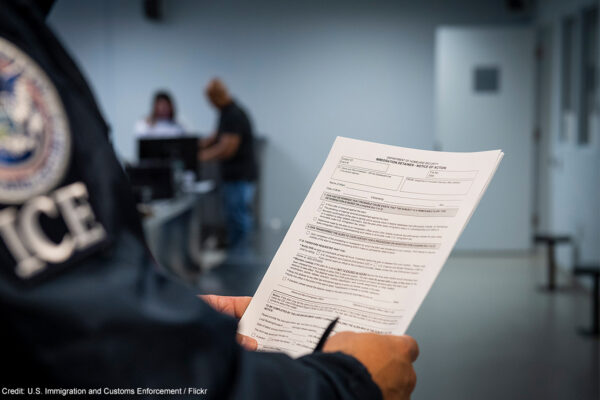Immigration and Customs Enforcement recently deported a survivor of the 2019 Walmart massacre in El Paso, Texas, Rosa,* who was slated to testify at the suspect’s trial.
So how did she end up in ICE’s custody?
Before she was able to testify as a witness to the murder of 23 people — a murder committed by a man who authored a xenophobic and anti-Latinx manifesto before the crime — Rosa was arrested at a traffic stop by local law enforcement officers and detained for two outstanding traffic citations. According to ICE, the agency issued a detainer, or a request for a local law enforcement department to detain a person for ICE past their scheduled release. As a result, a person otherwise allowed to legally go free, perhaps by paying a fine, posting bond, or simply because there was no reason for their initial detention, is instead jailed for up to two days, so ICE can then detain and deport them.
ICE picked up Rosa and deported her to Mexico the very same day.
Many states have laws that try to compel counties to honor such detainers. Texas, Florida, and many other states have mandatory collaboration laws on the books, increasing ICE’s reach into local communities and taking away local communities’ power to decide how to spend their resources. Some counties also work with ICE by participating in a program known as 287(g), which delegates to local law enforcement officers the authority to perform some of ICE’s work.
The Biden administration can protect people like Rosa, reduce fear in our communities, and save taxpayer resources by ending the use of ICE detainers. As Biden builds support for comprehensive immigration reform, his administration can move immediately to deliver meaningful and bold change by stopping ICE detainers and dismantling the 287(g) program.
Many law enforcement leaders who have personally witnessed the damage ICE has done in their communities are speaking out against these ICE programs, which undercut public safety by destroying community trust and contributing to a climate of fear. Just last November, voters in Charleston County, South Carolina, elected a new sheriff, Kristin Graziano, who committed to terminate the county’s longstanding 287(g) agreement with ICE and to no longer honor ICE detainers. She did so on her first day.
“We want people to be able to believe that they can turn to us, cooperate with us, when they’re a victim of a crime in our community,” Graziano said. “Our immigrant community currently does not have that trust in us, and that ends today with me.”
Two years earlier, Sheriff Garry McFadden of Mecklenburg County, North Carolina, said that he canceled the county’s 287(g) contract “because it erodes trust with our community and ties up critical resources that should be used to ensure public safety.”
Both Graziano and McFadden defeated incumbent sheriffs who entered ICE agreements and supported continued work with ICE.
In November, voters in two Georgia counties, Cobb and Gwinnett, soundly rejected candidates who supported continued ICE collaboration, and elected sheriffs who were critical of ICE’s harmful role in their communities. Sheriff Craig Owens of Cobb terminated his county’s ICE contract in January, citing the fact that many immigrants were “not reporting crimes” out of “fear,” and Sheriff Keybo Taylor of Gwinnett terminated 287(g) and announced that he will stop honoring ICE detainers in order to “eliminate distrust.” Over 30 percent of all ICE 287(g) interactions in 2020 took place in the two Georgia counties.
Steven Carl, the Police Chief in Framingham County, Massachusetts, similarly stated that participation with ICE makes people “terrified of us” and “afraid” to report crimes when he rejected collaboration between his police department with ICE. Indeed, it is no wonder that studies have found that local collaboration with ICE undermines public safety.
Repairing community relationships isn’t the only reason that more law enforcement officials have decided not to help ICE. Local police who participate in the 287(g) program are emboldened to commit racial profiling, where officers target people of color and find questionable pretexts to arrest them on local charges just so that they can later be transferred into ICE custody. Sheriff Graziano said ICE made the Sheriff’s Office in Charleston “complicit in racial profiling of the Latinx community,” and apologized for the harm it had caused.
Local collaboration with ICE further jeopardizes immigrants’ safety by emboldening those who would target and exploit them, knowing that they are too afraid to seek help. Sheriff Dave Mahoney of Dane County, Wisconsin, said he didn’t want his deputies “to become ICE agents” in part because doing so might “empower [those] who are preying on the non-documented who fear coming forward to law enforcement.”
As communities seek to undo the damage wrought by the previous administration, the Biden administration should help local leaders rebuild confidence and trust by ending the use of detainers and other ICE programs that only bring pain and anguish.
*Rosa is a pseudonym used for her protection.

